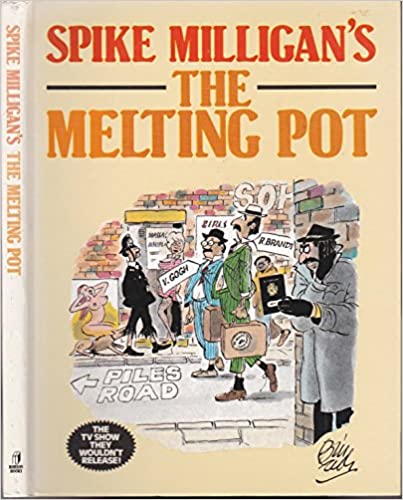ACH (1195) Mischa Popoff – Bohemian Rhapsody

In today’s show originally broadcast on February 21 2020, Andy is joined by Mischa Popoff, for a show entitled, “Bohemian Rhapsody.”
We discussed: what influenced Mischa to analyze and decipher this song; how the song is inverted as it actually starts in the middle; where Freddie Mercury cries out to Jesus Christ in the song; the missing line in the song that Freddie never sang, but which is contained in many published versions of the lyrics, including the lyrics at the link below; how Bohemian Rhapsody was the most expensive song ever recorded at the time of its release; how Freddie Mercury dated a woman for six years before he wrote this song; how the record company claimed they thought this song was too long; and many other topics.
Click Here For The Lyrics To Bohemian Rhapsody
Click Here For Details Of Mischa’s Book “Is It Organic?”
MISCHA’S ORIGINAL TWO PART ARTICLE ON BOHEMIAN RHAPSODY
Bohemian Misery, Part 1
By Mischa Popoff
Let us lay aside every weight, and the sin which doth so easily beset us, and let us run with patience the race that is set before us.
Hebrews 12:1
It was 1975 and homosexuality was barely a movement, still in the shadows, even in the “progressive” rock-music biz. Two years hence, Freddie Mercury would sing the prideful lyrics to “We Will Rock You” and “We Are The Champions,” arguably his band’s most-overtly pro-homosexual songs. But it would be decades before fans clued in to Freddie’s proclivities. In a moment of spiritual clarity, he penned his band’s biggest hit, his autobiographical “Bohemian Rhapsody,” a single with the highest-ever production cost at the time with all of its overdubbed, operatic harmonies. Mercury never explained what Queen’s songs were about, but there’s compelling evidence that between 1975 and 1977 he underwent a transformation based on the poor choices he made.
“Bohemian Rhapsody” is the conflicted prequel to later pro-homosexual songs by Queen, providing insight into Mercury’s internal torment. Tortured by his vices, struggling with sin, knowing it’s sin… and then, tragically, finally, and terminally, giving in, his lyrics take us from his first homosexual encounter, all the way, prophetically, to his untimely death.
We begin in the second part of the song where Mercury describes himself in the third person as an impressionable youth. You’d think he was talking about someone else: “I see a little silhouetto of a man.” But no, that’s just part of the deception. The whole chronology is inverted, you see, to throw his heterosexual fans off as he looks back to when he was young and innocent, as reflected in the insouciant nature of the accompaniment.
As a silhouette he’s just a cute young lad, basic and featureless, lacking character, playing the role of a boastful but cowardly, sixteenth-century commedia dell’arte clown, a “Scaramouche,” as part of some sort of theater group, the perfect quarry for an older homosexual assailant. Indeed, a man’s voice calls to him, “Scaramouche, Scaramouche, will you do the Fandango?” a sexually enticing dance in triple time. And, quicker than you can say “statutory rape,” Mercury finds himself subjected to a “Thunderbolt and lightning.” For a mere child inexperienced in the abject violence of sodomy, it is, he confesses, “Very, very frightening [to] me!”
Mercury and his band chant back-and-forth, “(Galileo) Galileo. (Galileo) Galileo, Galileo Figaro Magnifico-o-o-o-o.” And just who, pray tell, is this Galileo character? I’m glad you ask. It is none other than Jesus Christ, that’s who. Having just been sodomized, Mercury is crying out to be rescued from his guilt and spiritual torment, to say nothing of the physical pain common to ALL young boys when they are first violated by older men.
Wait just a minute here, I hear someone object… Jesus is Galileo? Yes. You see, Mercury couldn’t mention Jesus by name in a pop song without totally destroying his cred, so he refers to Him obliquely, via Luke 23:5–7, the point in Christ’s Passion where Pilate realized Jesus was a Galilean, and therefore (he presumed) not his problem, passing Him to Herod Antipas who had jurisdiction over the region of Galilee. So yes, Freddie Mercury, who would become rock ‘n roll’s most flamboyant, “out” homosexual, cried out to Jesus Christ our Lord and Savior… yes, his Lord and Savior, at least at that juncture. And he did it for all the world to hear. Sadly, no one listened. We all heard the lyrics, sure, but were all too mesmerized by the music to listen to the message.
Lest you doubt Mercury’s victimhood status, go to the next verse where he laments, “I’m just a poor boy, nobody loves me.” Precisely the type of low self-esteem that monstrous homosexual men prey upon. The band confirms this when they respond: “He’s just a poor boy from a poor family, Spare him his life from this monstrosity.” And with that line, it really couldn’t be more clear: even Mercury knows homosexual men are monstrous, or he wouldn’t have chosen that word.
Of crucial importance here, while the lyrics for “We Will Rock You” and “We Are The Champions” would be written by someone else just two years later, “Bohemian Rhapsody” comes to us exclusively from Freddie’s heart and soul, every last word of it. So yes, he thought homosexuals were monstrous. His words, not mine, dear reader.
Deflowered, Mercury is torn. “Easy come, easy go, will you let me go?” Of crucial importance here, it’s not his assailant to whom he’s appealing. It’s someone far more sinister, as you’ll soon see.
He cries out to God Himself to deliver him, shouting “Bismillah!” Arabic for In the name of God, harkening to his family’s roots in pre-Christian Zoroastrianism, a religion that opposes homosexuality, believing it a form of demon worship, an unforgivable offence necessitating immediate honor killing.
But, alas, the four-part harmonious response is, “No, we will not let you go.” It goes back and forth with Mercury’s band members joining him in shouting for this evil entity to “Let him go!” and Mercury, for his part, continuing to cry out to God, pleading to be “let go” from the evil that has him in its grip, until… finally… he turns his back on his family, his religion, and his past… and Freddie Mercury switches sides.
This is the turning point for many young men, especially now in an inverted culture that celebrates such inherently violent sexual activity, applauding these victims, urging that they stop being victims and join the dark side instead. They become, in every sense of the words, born again. Mercury penned the following line, but, tellingly, never sang it: “Never, never, never, never let me go!” He’s no longer yearning to be “let go.” It’s unmistakable; he has given in. His basest desires will henceforth be his “rhapsody,” his life’s passion in other words, right here in the physical world.
Like Macbeth, throwing away his afterlife in exchange for immediate gratification “here upon this bank and shoal of time,” as Shakespeare put it, Mercury has made the irrevocable decision to “jump,” to skip in other words “the life to come.” (Shakespeare, Macbeth, I, vii, 6–7) It’s as if he’s skipping a luncheon engagement. No big deal. He’s got more important things to attend to. Like having sex with boys.
And what, you ask, is this evil he had been pleading against until this point? He cries out in shock and surprise, realizing the normal world of love is now but a fast-fading memory: “Oh, mama mia, mama mia, Mama mia, let me go!” Yes, like all sexual deviants, he now wants his own mother to let him go because he’s no longer concerned with the evil he wanted to be freed from just a few lines earlier. And with his connection to his own mother extenuated to the breaking point, he finally identifies the sinister character involved in his spiritual decimation, declaring that “Beelzebub,” yes, that Beelzebub, “has a devil put aside for me, for me, for me,” as the music climaxes.
This is the “we” that had been foreshadowed above when his band sang “we will not let you go.” It’s Satan and his demons. And guess what? Mercury’s fine with this, and so, apparently, are his bandmates, along with everyone who worked behind the scenes with Queen. Everyone.
Stay tuned for the breakdown of the second part of this tragic song that has now deluded two generations of youth in Christendom. The story gets a lot better… worse actually, as Mercury’s health deteriorates and he mourns “at the last,” knowing full-well what awaits him, “when thy flesh and thy body are consumed.” (Proverbs 5:11)
“Bohemian Rhapsody” was never meant to be the anthem for the gay movement, rather a warning against disobedience. Every last word of it, straight from Freddie’s pen.
Bohemian Misery, Part 2
By Mischa Popoff
Once captive to the homosexual lifestyle, the young Mercury naturally wished to hold on to the only person he thought loved him; his assailant who, we learn, got Mercury stoned before raping him. But, alas, it was just a fling for the older man, as evidenced by Mercury’s indignity in the following stanza:
So you think you can stone me and spit in my eye?
So you think you can love me and leave me to die?
Oh, baby, can’t do this to me, baby,
Just gotta get out, just gotta get right outta here.
And no, Mercury is most-definitely NOT trying to get himself out of the homosexual pit into which he has thrown himself headlong when he sings that last line. He’s all-in with the homosexual lifestyle now. That line is in reference to getting out of the theatre group he was in when he was sodomized. He leaves, and, as surely as spring follows winter, the victim will now become the victimizer, as we’re about to see. Also, and by the way, that wasn’t literally spit in his eye, just so you know. And if you have trouble with the abject vulgarity of that line, stop reading right now ‘cuz this gets worse.
The young Mercury reminisces, perhaps still half stoned, his heart broken, and yet overwhelmed by dark urges that at some level he still wishes he did not have, but which he does not believe he can escape. We now turn to the first part of the song in which Mercury recounts how things went down right after being raped, asking, dazed and confused (as most rockers were in the ‘70’s and still are today) “Is this the real life? Is this just fantasy?” He feels “Caught in a landslide,” with “No escape from reality.” He tells himself, “Open your eyes, Look up to the skies and see.” But see what exactly? Well, that he’s “just a poor boy” of course, same as before. But this time he realizes that he needs “no sympathy.” Why? Simple. Because he’s going to become bi-sexual, that’s why. A compromise, he believes! And it’s as obvious to him as the skies above.
His eyes are now opened, implying they’d been closed ‘til then. Ah yes, the inversion of homosexuality rests upon such self-delusion, not only for the person involved, but for everyone around him; quite the opposite, if you will, of when the scales fell from Saul’s eyes in Acts 9:18, allowing him to see the truth, and become Paul.
The tenuous nature of Mercury’s decision is evidenced in the following stanza:
Because I’m easy come, easy go,
Little high, little low,
Any way the wind blows doesn’t really matter to me, to me.
Textbook bi-sexuality. Of course, you’ve always heard this as the intro to this prog-rock “classic,” and as such were diverted from knowing that we’re actually nearing the end of this tragedy. And so, soon enough, Mercury finds himself victimizing someone younger just as he had been victimized when he was but a young clown dancing the Fandango to garner attention.
The guilt overwhelms Mercury, and he likens himself to a murderer: “Mama, just killed a man, Put a gun against his head, Pulled my trigger, now he’s dead.” Again, you’d never figure this out unless you knew the timeline had been inverted. As is always the case with people trying to cover something up, Mercury begins by telling his story in the middle instead of at the beginning, like when a college history professor tells you WWII began when Hitler invaded Poland.
And, in case anyone’s having trouble with the double entendre here, recall that it wasn’t “spit” in Mercury’s eye when he was raped. Likewise, he’s not referring literally here to a gun. It’s his… well, you know. And, having forced himself onto this kid, the kid is now “dead” just like Mercury was after he was sodomized. And so, as “Another one bites the dust,” poor ol’ Freddie cries out to his mother, “Mama, life had just begun, But now I’ve gone and thrown it all away.”
But wait… exactly whose life was just thrown away when Mercury put his “gun” to this kid’s “head” and shot “spit” into him? Sorry folks, but it’s not the kid. Mercury’s crying out, yet again, for himself. He realizes that, having become the victimizer, having “killed” this young man’s very soul, he has crossed the Rubicon, or perhaps more accurately the river Styx, assuring his mother that he “Didn’t mean to make you cry,” as if to imply that this transmutation from victim to victimizer was just some sort of cosmic accident, even though it was anything but. He continues playing the victim card: “If I’m not back again this time tomorrow, Carry on, carry on as if nothing really matters.”
And with that he’s on his way to that big gay-pride parade in Hades, unencumbered by what anyone he grew up with might think. It’s what all sexual deviants want, lest they be made to feel shame: to be abandoned by their families so they won’t be constantly reminded of the Good times when they were innocent and were loved, truly and unconditionally in the warm embrace of their family. Family life simply isn’t conducive to the unbridled narcissism of the predatory homosexual.
Of course, a loving mother won’t listen to such tripe, and will do anything to save her son from the devil. But, alas, Mercury has made his choice. “Too late,” he tells her, “my time has come, Sends shivers down my spine, Body’s aching all the time.” Yeah… the poor guy. Being a homosexual can be so hard on the body. Your health is always the first thing to go, right after your moral compass. And so, with an AIDS diagnosis waiting for him just over a decade later that would take his life just four years thereafter, Mercury abandons his family and his old life forever: “Goodbye, everybody, I’ve got to go, Gotta leave you all behind and face the truth.”
Wait… the truth? Exactly what “truth” is Mercury talking about here? That the victim has become the victimizer? THAT “truth”? Yup. You see, as far as he is now concerned, his old life was the lie; his new life that has drawn him in like a black hole draws in light to reside in the crushing gravity of eternal darkness, is his new truth. You have your truth, Freddie Mercury had his, ‘til it killed him, and God only knows how many others, like this poor kid, whoever he was.
Indeed, Mercury knows full-well that the choice he has made will eventually catch up with him and kill him, slowly. The devil always gets his due. And so, as the band chimes in one more time with the bi-sexual maxim “any way the wind blows,” Mercury sings “I don’t wanna die,” adding that “I sometimes wish I’d never been born at all.”
We now skip to the final verse, in its proper place, right at the end of the whole debacle, not chronologically inverted to confuse you like Mercury’s first two homosexual “experiences.”
Lost forever, fallen by choice, ruled by his passions, and soon to be physically crushed by his pursuit of sin, Mercury concludes by wallowing in self-pity with a homosexual swan song, lamenting that “Nothing really matters, Anyone can see, Nothing really matters, Nothing really matters to me.” And, though the liner notes do not include an interrogation mark at the end of the band’s final line, it seems unmistakable by the inflective tone of the back-up singing that they conclude with a question, not a statement: “Any way the wind blows[?]” not affirming, rather questioning the decision their front-man has made, thereby confirming Mercury’s torment and self-doubt, the internal conflict embedded within this song that he would completely and so-recklessly abandon two years later.
But what about the part where he was crying out to “Galileo” to be saved? Ah yes dear reader. That turns out to be the most important part in all of this, as discussed back in Part 1. For, by having included mention of it we are left to conclude that by the end of the song, Mercury has abandoned Jesus as his Savior. Why? Isn’t it obvious? Because he is now his own god.
But wasn’t he Zoroastrian? Why is he calling to Jesus? For the same reason people of all religions so-often do, because only Jesus offers unrestricted forgiveness for sin, asking nothing except for fulfilling, committed spiritual love in return. It was but a brief moment of hope for redemption for Mercury, one which he abandoned. You could say he decided to spit in God’s eye.
But, alas, ignoring the potentially redemptive aspect of this song, and focusing instead on the effusive, selfish rapture of it, “Bohemian Rhapsody” has made a comeback in our age of government-sanctioned narcissism. Yes, Mercury died horribly. But no matter. A couple of fresh young sodomites were found to replace him, one on stage who is Jewish, the other on screen who is a lapsed Coptic Christian. The band picked right back up where they left off, almost as if all the decades had not passed by.
Queen toured, made a $52-million biopic, and their songs are back in rotation on our kids’ fave radio station, with “Bohemian Rhapsody” still firmly at the top of the charts. It’s 1975 all over again, except without the guilt. Redemption from sin, in short, is for losers. To quote from the band’s subsequent hit, “We Are The Champions,” the surviving members of Queen and their entourage of up-and-coming sodomites simply have “No time for losers.” Why? “‘Cuz we [homosexuals] are the champions of the world.” Indeed they are, according to the secular state anyway, right up there with feminists and war-mongering, Zionist neo-cons; the high-priests of the new morality you’re just too old to understand.
Final proof for all of the above comes in the fact that Mercury had been involved in a relationship with a woman for a few years leading up to his writing of “Bohemian Rhapsody.” He officially came out as bi-sexual to his inner circle when he confessed to this poor woman that he had had a homosexual affair behind her back. How does this prove that this operatic composition is about homosexual torment? Because, this poor woman doesn’t even get mentioned. It’s as if she had never been part of Freddie’s life, exactly as he wished his own mother had never been. And while she was no doubt devastated when she heard the news, she probably realized she had dodged a bullet when Freddie was dead from AIDS just 16 years after the break-up.
As Jesus said, “wide is the gate, and broad is the way, that leadeth to destruction, and many there be which go in thereat.” (Matthew 7:13) May your children be delivered from the evil to which this artist, like so many, finally and terminally succumbed, an evil now being purveyed at taxpayer expense, alongside abortion on demand, gay marriage and no-fault divorce.
And may you have the strength in Christ to warn others by telling them what this song is really about every time it’s played. Above all else, make sure to always love homosexuals alongside all the rest of God’s children who are sexually promiscuous, especially if they’re young and have not been given over by God “to a reprobate mind,” (Romans 1:28) for “such were some of you,” (1 Corinthians 6:11) as indeed was I before I was saved. Always invite the fallen to your church so that they might hear His Word and be reminded what true love is, never again to be encouraged, much-less applauded, as they contemplate taking that one-way ticket down Beelzebub’s paved-tollway to hell.
Above all else, in case you think you might play it safe and avoid discernment of Mercury’s sin, remember that if you try to love everyone unconditionally, you’ll love no one. May you and your family endure to the end, and never falter in exposing this evil that now masquerades as entertainment. For the fear of God is to hate such evil (Proverbs 8:13), always exposing pride and arrogancy to the blinding Light of His Truth, never hating your fellow man under any circumstance, only detesting with every strand of your being the sin that consumes him, as described so perfectly in this song, forever and ever, amen.
In His name.
Mischa Popoff grew up on a grain farm in Saskatchewan where he earned a degree in history. He now lives in Texas where he works to protect the family. This article first appeared in the December edition of Culture Wars magazine and is re-published with permission from the editor, Dr. E. Michael Jones.




